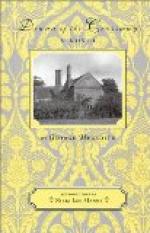‘I may call?’
‘You will be welcome.’
‘To tell you of the funeral—the last of him.’
‘Do not fail to come.’
She could have laughed to see him jumping on the steps of the third-class carriages one after another to choose her company for her. In those pre-democratic blissful days before the miry Deluge, the opinion of the requirements of poor English travellers entertained by the Seigneur Directors of the class above them, was that they differed from cattle in stipulating for seats. With the exception of that provision to suit their weakness, the accommodation extended to them resembled pens, and the seats were emphatically seats of penitence, intended to grind the sitter for his mean pittance payment and absence of aspiration to a higher state. Hard angular wood, a low roof, a shabby square of window aloof, demanding of him to quit the seat he insisted on having, if he would indulge in views of the passing scenery,—such was the furniture of dens where a refinement of castigation was practised on villain poverty by denying leathers to the windows, or else buttons to the leathers, so that the windows had either to be up or down, but refused to shelter and freshen simultaneously.
Dacier selected a compartment occupied by two old women, a mother and babe and little maid, and a labouring man. There he installed her, with an eager look that she would not notice.
‘You will want the window down,’ he said.
She applied to her fellow-travellers for the permission; and struggling to get the window down, he was irritated to animadvert on ’these carriages’ of the benevolent railway Company.
‘Do not forget that the wealthy are well treated, or you may be unjust,’ said she, to pacify him.
His mouth sharpened its line while he tried arts and energies on the refractory window. She told him to leave it. ’You can’t breathe this atmosphere!’ he cried, and called to a porter, who did the work, remarking that it was rather stiff.
The door was banged and fastened. Dacier had to hang on the step to see her in the farewell. From the platform he saw the top of her bonnet; and why she should have been guilty of this freak of riding in an unwholesome carriage, tasked his power of guessing. He was too English even to have taken the explanation, for he detested the distinguishing of the races in his country, and could not therefore have comprehended her peculiar tenacity of the sense of injury as long as enthusiasm did not arise to obliterate it. He required a course of lessons in Irish.
Sauntering down the lane, he called at Simon Rofe’s cottage, and spoke very kindly to the gamekeeper’s wife. That might please Diana. It was all he could do at present.
CHAPTER XXI
‘The young minister of state’




